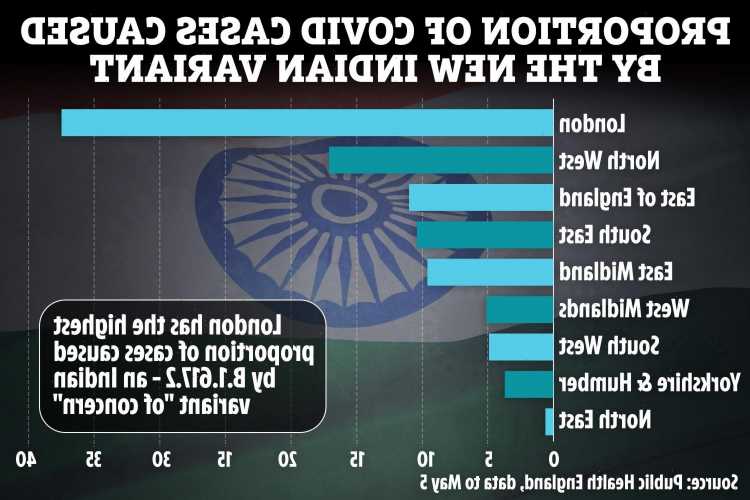THE NEW Indian Covid variant is behind at least 40 per cent of London cases, alarmed scientists have warned.
Called B.1.617.2, the new strain was labelled a “concern” by Public Health England last week because it spreads so rapidly.
🔵 Read our green list countries live blog for the latest updates
Data shows that the international hub of London could become an epicenter of the new variant, with cases also high in Bolton, Greater Manchester.
And of the cases seen in the capital, only a fifth have been among travellers to India, suggesting community spread is well underway.
B.1.617.2 has grown in numbers at an alarming rate when compared with other new variants, such as that from South Africa and Brazil, and even against the other two variants from India – B.1.617 and B.1.617.3.
It has been confirmed in at least 509 people, according to Public Health England, double the 202 the week prior. But this figure is at least a week old.
Dr Deepti Gurdasani, an epidemiologist and senior lecturer at Queen Mary University of London, told GMB today: “We have a new variant growing within the UK.
"Cases of this new variant are doubling every week within the UK while other variants are dropping.
“Overall cases have been dropping, which shows that even with current restrictions in place, this variant is growing very very quickly.
“In London, 50 per cent of cases now are no longer the so-called Kent variant.”
The “Kent variant”, B.1.1.7, is still the dominant strain in the UK.
PHE says B.1.617.2 appears equally transmissible as the Kent variant, but some scientists believe it can spread even faster.
At the current rate of growth, B.1.617.2 is set to overtake in a matter of weeks.
Prof Sharon Peacock, Director of COG-UK – a group which tracks Covid variants – suggested this would mean tighter restrictions.
“Looking ahead, if transmissibility of B.1.617.2 is comparable (or less than) B.1.1.7 (Kent variant), current restrictions would be expected to maintain the current progress in COVID-19 control,” she said.
“But more data and data analysis is required to understand whether this is the case, whether B.1.617.2 can out-compete B.1.1.7, and if so, what this means for disease control.”
Capital problem
Prof Christina Pagel, a mathematician and professor of operational research at University College London, said a PHE report last Friday contained “some quite disturbing” details on B.1.617.2.
She wrote on Twitter that “the rapidness of B.1.617.2 is evident”.
Scientists track cases of variants by genetically sequencing the swabs of positive Covid tests.
They do this for around 50 per cent of all positives giving a rough estimate of the prevalence of each coronavirus strain.
Half of cases sequenced in London are due to new variants.
Prof Pagel said B.1.617.2 could “potentially” be behind all of these.
However the report said B.1.617.2 has been the cause of 37.5 per cent of cases in London, 17.1 per cent in the North West, and roughly one in ten cases in the East Midlands, EAst of England and South East.
No more than half of those cases in each region are in people who have travelled.
Overall, 7.3 per cent of tests sequenced up to May 5 were caused by the Indian variant B.1.617.2.
Cases are still relatively small – there have been 191 cases in London and 87 in the North West.
But Prof Pagel said the data shows B.1.617.2 is “in the community”, and that the Kent variant is “still dominant but losing ground to B.1.617.2”.
The PHE report said B.1.617.2 may have already “replaced the Kent variant to some extent” in some regions.
This is a concern because vaccines that have been given to millions of Brits have been designed to tackle older variants.
They have been tested against the “original” coronavirus strain from Wuhan to prove efficacy, and have since been shown to work against the Kent strain.
But the jabs have not been tested against B.1.617.2.
It does have a mutation called L452R which “has been associated with weaker neutralisation of the virus” in blood samples of people with antibodies, Prof Peacock said.
However, she said it was “reassuring” that B.1.617.2 does not contain E484Q, which is present in the other Indian variants and shown to escape immunity in very early studies.
Prof Peacock said: “There is no evidence at the present time to indicate that vaccines will not work, and it remains essential that people are encouraged to become vaccinated.
“The most important messages remain exactly the same – for people to comply with precautions to prevent infection and prevent spread to others, and to get their vaccination when called.”
Source: Read Full Article





